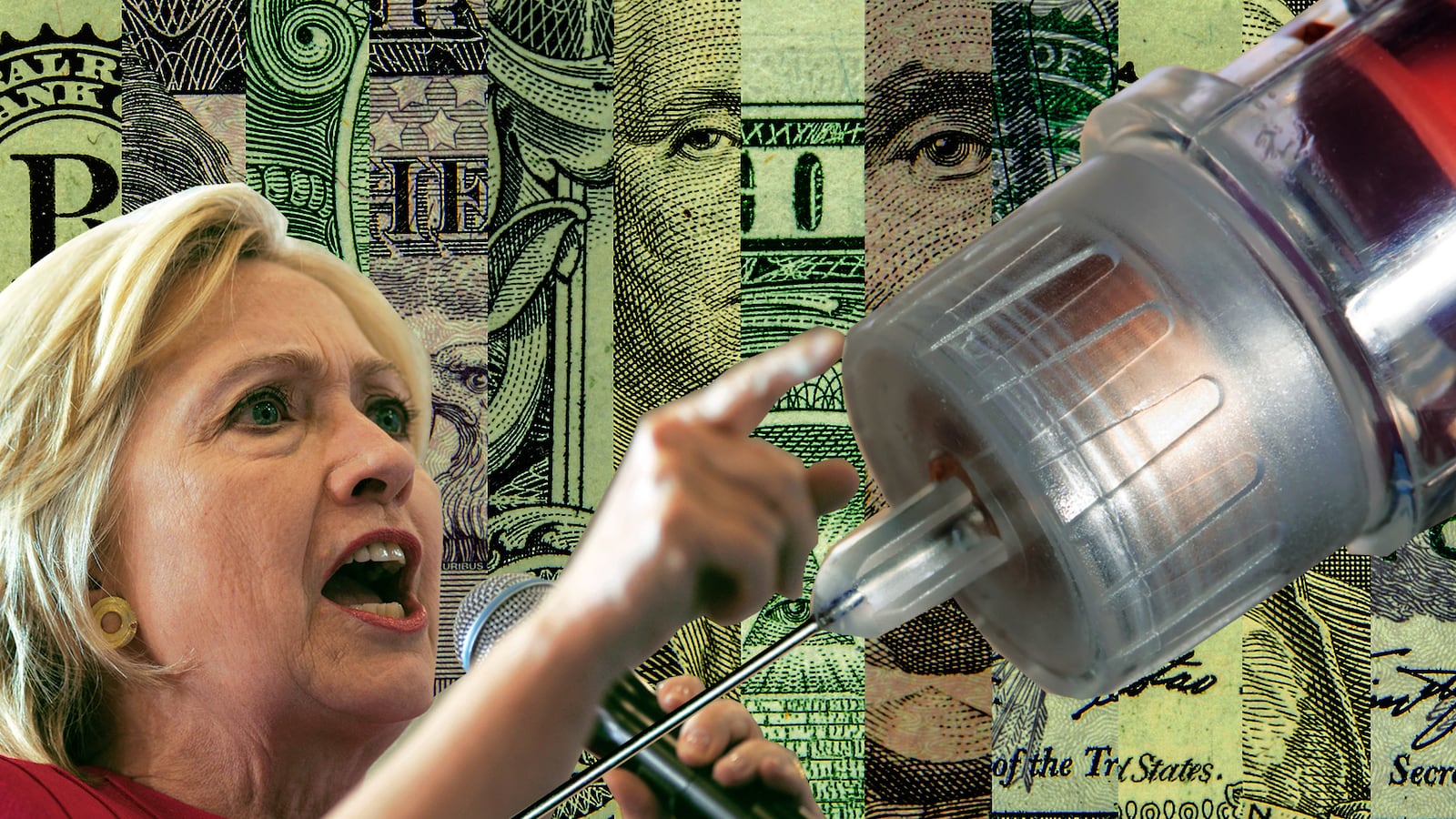Was it only about a week ago that we learned that the price of EpiPens, a widely used “epinephrine auto-injector” used to treat potentially fatal allergic reactions, has jumped from $100 to $600 per two-pack over the past few years? After an avalanche of bad publicity, including letters from Republican Iowa Sen. Chuck Grassley and Democratic presidential nominee Hillary Clinton, threatening price controls, the maker of the device, Mylan, has announced plans to introduce a generic version at half the current price.
Problem solved, right? Not even close. The freakout over EpiPen inflation shows an utter lack of understanding of how the current approval process for drugs and medical devices makes them more expensive and less likely to find their way on to the shelves at your local pharmacy. This isn’t a morality tale about the depredations of capitalism, it’s a particularly vivid reminder that whatever Washington touches it tend to ruin.
Hillary Clinton certainly didn’t get the memo. To her, the situation is "just the latest troubling example of a company taking advantage of its consumers.” When she becomes president, she avers, drug companies will be “required to explain significant price increases, and prove that any additional costs are linked to additional patient benefits and better value.”
If only it were as easy as threatening price controls.
To be sure, the maker of EpiPen is greedy as all hell. There’s nothing at all wrong with the profit motive, of course, assuming that a business comes by its dominant position by offering better products and services at prices customers are willing to pay. But Mylan’s path to monopoly pricing in EpiPens has everything to do with politics and nothing to with laissez-faire economics. The approval process isn’t just long and expensive, it also opens things up to politics.
That’s one of the reasons why Mylan, which bought the rights to EpiPen in 2007, spent more than $2 million lobbying Washington in 2015. The company’s PAC has spent about $80,000 so far in the 2016 election cycle. Maybe it’s just coincidence, but Mylan, one of the largest generic drug companies on the planet, faces little competition from other companies that want to make devices similar to the EpiPen.
As the pseudonymous doctor Scott Alexander documents at Slate Star Codex, the amount of epinephrine in an EpiPen’s pre-measured dose costs about 10 cents a shot. But every time a new company tries to bring a rival product to market, the Food and Drug Administration (FDA) finds a reason to just say no. Sandoz, Teva Pharmaceuticals, Sanofi, and Adamis have all tried and failed. That seems more than a little fishy given the relative simplicity of the basic drug and delivery system involved. We’re not talking brain surgery here—we’re talking about a pre-loaded, single-use syringe.
The one equivalent device that has made it to market is called Adrenaclick and it’s about $400 cheaper than EpiPen. But EpiPens are explicitly protected from the sort of substitution with generic medicines that we take for granted with, say, anti-depressants and statin drugs. “If a doctor writes a prescription for ‘EpiPen,’” says Alexander, “the pharmacist must give an EpiPen-brand EpiPen, not an Adrenaclick-brand EpiPen.”
It shouldn’t surprise anyone that, as my Reason colleague Scott Shackford has noted, Mylan’s CEO knows her way around politics as she does around epinephrine. In fact, Heather Bresch is the daughter of West Virginia’s former governor and current senator, Joe Manchin. Her company employs lobbyists who served as head of AIDS policy for George W. Bush and a senior aide to President Bill Clinton, among others.
She’s also the head of the generic drug industry’s lobbying group and told The New York Times that one of her biggest accomplishments was helping to pass The Generic Drug User Fee Amendments of 2012, which “required more inspections of overseas drug manufacturers.”
The announcement that Mylan will start selling a cheaper version of the EpiPen may well be enough to calm the roiled waters this time. Certainly Hillary Clinton, Chuck Grassley, and others will be able to claim they stood up for all of us who are paying more out-of-pocket costs under Obamacare. But any sort of targeted fix for EpiPens misses a far bigger and more important point.
The best way—and the only permanent way—to reduce prices and increase the quality and quantity of medicines and medical devices is to allow actual market competition to flourish. Yet by common knowledge, the FDA drug-approval process costs between $1 billion and $5.8 billion per new drug and takes between 10 and 15 years.
And, as the fate of all those would-be competitors to the EpiPen suggest, that investment hardly guarantees much of anything. Indeed, only about 20 percent of the drugs that make it through the approval process and reach your pharmacist’s shelves attain “blockbuster status.”
The easiest fix to this is to modify the FDA’s stultifying three-stage protocols, developed 50 years ago, for approving new drugs. As Reason’s science correspondent, Ronald Bailey, has written, “between 1999 and 2005, clinical trials saw average increases in trial procedures by 65 percent, staff work by 67 percent, and length by 70 percent.” The first two stages of clinical drug trials involve hundreds of people while Phase III involves thousands of people receiving the test drug and placebos.
Fully 90 percent of the cost of developing new drugs is tied to Phase III and granting conditional approval to drugs that have passed the first two phases would “accelerate access to more drugs, especially drugs that aim to treat the common diseases that afflict more of us," writes Bailey. In fact, the FDA already does this in a small number of cases and there’s no reason it shouldn’t expand the practice, especially as patients become their own advocates and "right-to-try” laws become increasingly more widespread.
Anything that reduces the costs of developing new drugs and devices will help create a far more competitive medical landscape. A bill that addresses some of these issues, The 21st Century Cures Act, overwhelmingly passed the House this year and, after many delays, will be taken up by the Senate in September.
The modern FDA was borne out of the Thalidomide scare of the early 1960s and since then, an impossible quest for absolute safety has been the guiding light in creating new drugs and devices. That’s understandable but wrong. Mistakes still happen and, in the end, what keeps drug companies and device makers from peddling poison isn’t the FDA or government bureaucrats but the knowledge that killing or damaging people will lead to bankruptcy and possibly prison.
No system of checks and balances is perfect but there’s simply no way to make drugs cheaper without speeding up and lowering the cost of developing them. And there’s no question that delaying approvals and squelching competition has costs too—ones that range far beyond a $600 EpiPen.
“A 2005 National Bureau of Economic Research study found that…faster FDA drug approvals…in the 1990s saved far more lives than they endangered,” writes Bailey. “In fact, new drugs saved up to 310,000 life-years compared to 55,000 life-years possibly lost to the side effects of drugs that were eventually withdrawn from the market.”
That’s a calculus I don’t expect politicians angered by the EpiPen price surge to be making any time soon. But the plain fact is that the real problem with costs and innovations in the medical world isn’t that companies are run by “greedy” bastards such as Mylan’s Bresch (“I am a for-profit business,” she told the Times. “I am not hiding from that.”)
It’s that powerful and well-connected companies can use politics to rig markets and that it takes too damn long and costs too much money to develop new drugs and services to us all. That’s something politicians, not capitalism, are responsible for and only politicians can—and should fix.






